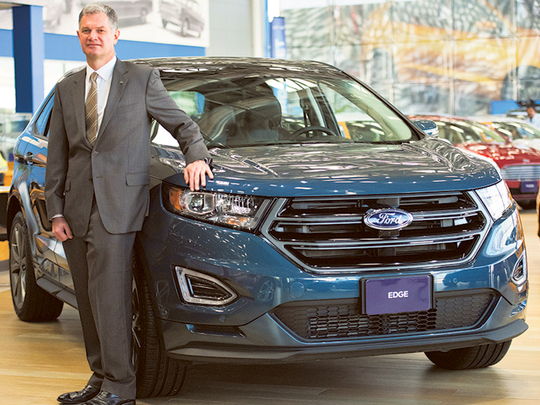
Dubai: Driverless cars will soon be hitting Detroit. They needn’t necessarily be coming via Silicon Valley either.
Mainstream automotive manufacturers are now starting to put their considerable resources and chutzpah in the drive towards autonomous driving vehicles. And they are willing to take on the tech giants head-on in the race towards these goals. Or, where possible, partner them.
Ford Motor Co. has just unveiled a mix-and-match strategy — under its Smart Mobility initiative — to bring out fully autonomous model by 2021, which will be used for ride sharing services or for package deliveries. And no, it is not making one for the individual car owner to zip around town.
“We don’t expect to see fully autonomous vehicles used for personal ownership for several years after their first introduction ... because the economics don’t make sense,” said Jacques Brent, president of Ford Middle East & Africa. “But if you look at the opportunities that are presented when removing the driver from the equation in mobility services such as ride hailing, on-demand shuttles or package delivery, it’s truly exciting.”
Ford’s first fully autonomous vehicle will make do without a steering wheel, gas and brake pedals.
“Consumers will have access to new and affordable mobility solutions,” said Brent. “That is why it is our intention to have a fully autonomous, “Level 4 capable” vehicle with no driver controls commercially available in a ride-hailing or ride-sharing service in 2021.” [Level 4 conforms to a system where the vehicle’s automated system can control it in all instances except during severe weather conditions.]
Other carmakers are scripting their own versions of what a driverless future would look like. Germany’s BMW has got some willing help from Intel in its efforts to bring a model out by 2021. [One does tend to see 2021 being the delivery point for a lot of these initiatives. It sure has a nice ring to it.]
But haven’t some of the Silicon Valley giants already got a solid lead in the race towards autonomous driving? Or at least been talking it up far more than mainstream manufacturers have done in recent times?
Brent refutes this point vigorously. “We respect all competitors, and Silicon Valley is a community where we will fully participate, collaborate and — at times — compete against others,” he added. “We’ve been working on autonomous vehicles for more than a decade, and we’re currently a clear leader on autonomous vehicle technology within the auto industry.
“We’re ready to take the next step, using our engineering know-how and technical partnerships. We have been — and will continue — working with many companies related to our Ford Smart Mobility plan. In our recent announcement, we’re investing in or collaborating with four start-ups to make a Ford autonomous vehicle a reality.”
These alliances will bring in enhanced computer vision technology, cutting-edge light detection and ranging sensors, and super-refined 3D mapping.
“Creating long-term value and profitable growth are the drivers of everything we do,” said Brent. “We are developing our autonomous vehicle with the long-term plan to offer it in high volumes like any other Ford vehicles which are based on global platforms.
“That’s part of Ford’s DNA — bringing life-changing technologies to millions of people versus the select few who can afford luxury vehicles. Think of it as democratising technology.”












